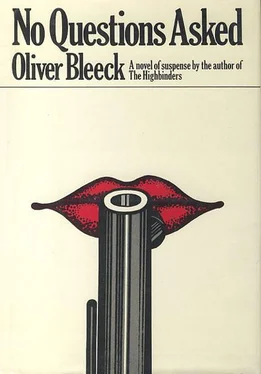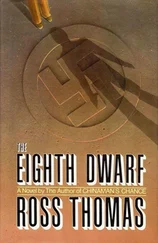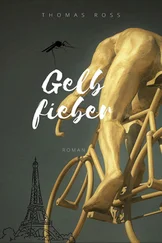“So it wasn’t a trick? I mean you were really trying to buy the book back?”
“Yes.”
She smiled, but there was more regret in it than anything else. “Although I knew it wasn’t possible, I was hoping that you would turn out to be something entirely different.”
“Such as?”
“Oh, I don’t know. Maybe somebody who had a cigar stub in his mouth and looked slightly sinister and conspiratorial. Somebody I could blame for Jack’s death and who would confess that it was all a horrible mistake and that Jack was innocent.”
I shook my head. “He wasn’t.”
“No, I know that. I haven’t accepted it yet, but I know it.”
“I wonder if we could get back to how you, or Marsh, I suppose, went about finding a buyer for the book?”
Maude Goodwater rose and moved over to the glass and looked out at the sea. “Hindsight is very useful, isn’t it?”
“Useful and painful,” I said.
“I had gone over my financial situation with my attorney. I won’t bother you with the mess I’m in, but it’s bad. Very bad. So it was decided that I should sell this place and the book. By doing so I could pay off the debts and the taxes and have something left over. Not too much, but enough to last a year or so. I discussed it with Jack, of course, and he offered to arrange for the sale of the book. He said he had certain contacts that he could use to secure the highest possible price. I believed him, of course. Why shouldn’t I?”
“No reason.”
She turned from the glass and the sea and came back to the chair and sat down. “Jack brought a man out to see me, a most curious little man. I don’t mean to use ‘little’ in the pejorative sense, but the man was really quite small.”
“Did he have a name?” I said.
“Ambrose. Felix Ambrose. We discussed the book and Ambrose seemed quite knowledgeable. He used all sorts of rather esoteric jargon that sounded most impressive — to me, at least. He said that he had a buyer for the book who would pay seven hundred and fifty thousand dollars, but who insisted on anonymity.
“How much would Ambrose get?”
“He asked for two percent as his finder’s fee.”
“Fifteen thousand dollars?”
“Yes.”
“Did he ask for any in advance?”
“No. He didn’t.”
“Did he say why the buyer insisted on remaining anonymous?”
“He said that the buyer was very rich and very eccentric and hated publicity of any kind.”
“But was just crazy about rare old books.”
“Yes, I suppose that’s the impression I got. I must be awfully naive. There probably never was a buyer, was there?”
“I don’t know,” I said. “But I’m beginning to doubt if there was one who was willing to pay three-quarters of a million.”
“It’s so ridiculous, isn’t it? I’ve told all this to the police and to some insurance company investigators that Max Spivey asked me to see, and every time I tell it I have the feeling that I’m not talking about myself. I seem to be talking about some innocent little old lady who’s just been fleeced out of her life savings. But that’s not me. I always thought of myself as rather — well, I guess worldly. I watched my father die a broken man. I went through a nasty marriage and an even worse divorce. I’ve had my share of lovers — both men and women, if that matters. I’ve tried drugs. I even got terribly rebellious once and tried earning my own living for a couple of years and that was a real eye-opener. So I thought I knew what it was all about — out there in the big world where bad things happen. But this—” She shook her head. “This is just absurd.”
“You can’t blame yourself,” I said. “You got taken by someone you seem to have loved and trusted. It wouldn’t make it hurt any less for me to tell you how often it happens, so I won’t.”
She used a forefinger to wipe something away from her left eye. It may have been a tear although I don’t think so.
“It does happen to other people, doesn’t it?”
“Every day.”
“And what do they do about it?”
“Just about what you’re doing. They blame themselves mostly. After a while they get angry, really angry, and when the anger’s directed at somebody else instead of themselves it seems to help. Not much, but some.”
She chewed on her lower lip for a while as if thinking about something. “You haven’t given me any great advice, have you?”
“No.”
“But talking about it helps, doesn’t it? Just talking about it.”
“Almost always. If I weren’t here, you could find a priest or a psychiatrist or just somebody on a park bench. The result is often pretty much the same.”
“Would you like a drink?”
“Sure, if you’re having one.”
“I am,” she said and rose and moved over to a small bar that was near the dining table, which was the kind that had a chrome frame and legs and a glass top.
“It’s not too early for martinis, is it?”
“Probably.”
“Well, we’ll have one anyway.”
She mixed them in a small pitcher and poured them into a couple of glasses. She carried them over and handed me one. After she took a sip she tried to grin and she almost made it. “Okay,” she said, “what else do you want to know about that son of a bitch, Jack Marsh?”
I smiled at her. “A couple of personal things.”
“Go ahead.”
“What kind of financial shape was he in?”
“Well, we had one of those oh-so-sensible, oh-so-modern arrangements. He lived here and we split expenses. He gave me a check every month for seven hundred and fifty dollars and I paid the bills — food, the mortgage, utilities, things like that. He was sort of a star boarder, I guess.”
“Did he spend a lot?”
She nodded. “He blew it — on clothes and that car of his and the track and in Vegas. I guess all. I really know is that he was always broke. Or said he was.”
“What about his business?”
“He worked hard, I’ll say that for him. But we never talked much about it. His cases, I mean. When he moved in here he moved his office from Hollywood out to Santa Monica. The commuting was better.”
“Did he have anybody working for him?”
“Just a secretary. Her name’s Virginia Neighbors and she’s in the book.”
“You wouldn’t have a key to his office, would you?”
Maude Goodwater looked at me over the rim of her glass. “You know, I thought there was something familiar about you.”
“What?”
“You ask questions the same way he used to. Jack, I mean. There’s that same low-key inflection. Both, of you would ask the time of day the same way you’d say, ‘And after you got through stabbing him with the butcher knife, Mrs. Smith, what did you do then?’ ”
“It’s sort of a trick,” I said.
“Did you used to be a detective?”
“No. I was a reporter once.”
“Same thing.”
“Detectives don’t think so, although some reporters do. What about the key?”
She went over and picked up her purse from where it was lying in a leather chair. She took out a ring and removed one key. She looked at it and then came over and handed it to me. “I wonder if that’s smart?” she said.
“I’m trying to find out what happened. Whether it’s smart or not depends on whether you really want to know.”
“No matter what?”
“No matter what.”
“Uh-huh,” she said. “I think I do. At first, all I wanted to do was forget it, but now I think I want to find out what he was really like. I’m still not sure. I’ve got the feeling that I’ve been living with some stranger.”
“When I find out something, I’ll let you know.”
She looked around the room. “You like it out here?”
Читать дальше












